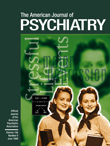Gabapentin-Induced Ejaculatory Failure and Anorgasmia
To the Editor: Psychotropic drugs are well known to affect sexual functioning (1) and may contribute to patient noncompliance. The serotonin reuptake antagonist antidepressants are particularly known for their effects on orgasm (2–4). Much less is known about the adverse sexual effects of anticonvulsants, although one case report suggests that carbamazepine may cause ejaculatory failure (5). We report a case of ejaculatory failure and anorgasmia associated with gabapentin.
Mr. A was a 41-year-old man with a long history of bipolar II disorder and alcohol dependence with intermittent cocaine abuse. After completing a 4-week alcohol treatment program, he developed mild hypomania. He had no medical problems and no history of sexual dysfunction. Gabapentin treatment was initiated for hypomania at 300 mg per day and gradually titrated to 600 mg 3 times per day over 1 month. While taking 300 mg of gabapentin 3 times per day, he noticed orgasm was more difficult to attain. Neither libido nor erection was affected. Gabapentin reduced his hypomania, but as the dose increased, he found ejaculation and orgasm increasingly difficult to achieve. He could have intercourse with a normal erection for 20 minutes but could not ejaculate. At times he attained a sense of incomplete orgasm sensation but did not ejaculate. There was no retrograde ejaculation. Mr. A took gabapentin for 4 months and eventually stopped the medication because of his inability to ejaculate. During this time, he remained abstinent from alcohol, and the results of three urine drug screens for cocaine and marijuana were negative. He denied using other illicit or over-the-counter drugs. One week after stopping the gabapentin dose, he reported the return of his usual orgasm and ejaculation abilities.
This case demonstrates a clear on/off phenomenon of anorgasmia related to gabapentin, which may be dose related. The frequency of this adverse effect is unknown, although sexual side effects were reported as uncommon in clinical trials when epilepsy was treated. It is unknown if gabapentin might affect other areas of sexual functioning, although, in this man, it did not. The mechanism of action of gabapentin is unknown, and the effects on ejaculation or other aspects of sexual function are also unknown. As gabapentin becomes more commonly used in psychiatric practice, the frequency of this adverse effect may become more apparent.
1. Gitlin MJ: Psychotropic medications and their effects on sexual function: diagnosis, biology, and treatment approaches. J Clin Psychiatry 1994; 55:406–412Medline, Google Scholar
2. Hsu JH, Shen WW: Male sexual side effects associated with antidepressants: a descriptive clinical study of 32 patients. Int J Psychiatry Med 1995; 25:191–201Crossref, Medline, Google Scholar
3. Balon R, Yeragani VK, Pohl R, Rainesh C: Sexual dysfunction during antidepressant treatment. J Clin Psychiatry 1993; 54:209–212Medline, Google Scholar
4. Labbate LA, Grimes JB, Hines A, Arana GW: Sexual dysfunction induced by serotonin reuptake antidepressants. J Sex Marital Ther 1998; 24:3–12Crossref, Medline, Google Scholar
5. Leris AC, Stephens J, Hines JE, McNicholas TA: Carbamazepine-related ejaculatory failure. Br J Urol 1997; 79:485Crossref, Medline, Google Scholar



